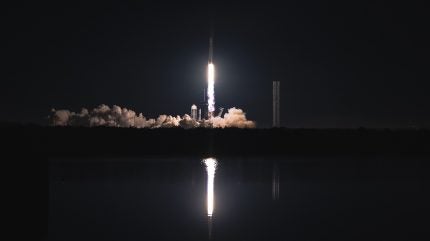
The US Space Systems Command (SSC) has contracted a series of space launch providers in a multi-billion-dollar deal to deliver military capabilities into orbit as part of the National Security Space Launch (NSSL) Phase 3 Lane 1 programme.
Awarded companies include Blue Origin, Space Exploration Technologies (also known as SpaceX), and United Launch Services, under a multiple-award, firm-fixed-price (FFP), indefinite-delivery/indefinite-quantity (IDIQ) contract with a maximum cumulative ceiling of $5.6bn for launch services procurement.
In a 13 June 2024, contract notice issued by the US Department of Defense (DoD), it was stated that the contract will include a five-year ordering period which will continue through to June 2029, with an option for an additional ordering period of five years.
In total, seven offers were received to deliver the HSS Launch Phase 3 Lane 1 programme.
Both Blue Origin and SpaceX were founded by billionaire US industrials in Jeff Bezos and Elon Musk respectively, seeking to commercialise space-access capabilities. The companies have considerable interests in the defence sector, providing launch services for paying customers like the SSC.
United Launch Services operates as an entity under the United Launch Alliance, a joint venture between Boeing and Lockheed Martin and significant player in the US space sector, recently launching astronauts aboard Boeing’s Starliner capsule to the International Space Station in early June.

US Tariffs are shifting - will you react or anticipate?
Don’t let policy changes catch you off guard. Stay proactive with real-time data and expert analysis.
By GlobalDataSpeaking earlier this year to a US Congressional committee, Chief of Space Operations Gen Chance Saltzman stated that against a near-peer rival, space superiority was “the linchpin”, and that without it the US would be unable to deter rivals and conflicts.
“Until we have built the infrastructure to achieve space superiority, the Space Force is a work in progress,” Saltzman said.
US Space Systems Command diversifying launch options
In October 2023 the SSC released the final NSSL Phase 3 Requests for Proposals (RFP), detailing opportunities for space delivery capabilities across a series of ‘Lanes’, with an apparent intent to help mature and diversify the sector.
“Our Phase 3 strategy provides maximum opportunity for emerging and experienced launch service providers alike to participate in the NSSL programme,” said Col Douglas Pentecost, Assured Access to Space deputy program executive officer.
“By the end of the Phase 3 we will have at least three providers fully capable of meeting all NSSL requirements, as well as a full complement of launch service providers using systems designed for more risk-tolerant space vehicles launching to traditionally commercial orbits.”
Lane 1 was designated as an IDIQ contract open to all eligible bidders, and included the opportunity for annual on-ramping for emerging providers as they demonstrate successful launch systems.
The US Space Systems Command stated that Lane 1 was designed for more “risk-tolerant space vehicles launching to traditional commercial orbits”, with the US Space Force “tailoring its mission assurance level to reflect the more risk-tolerant space vehicles to achieve greater savings and access to diverse launch systems”.
In Lane 2, three launch service providers will be competitively awarded FFP Indefinite Delivery Requirements contracts. These contracts will be awarded to the best value, next best value, and third best value launch service providers who meet all NSSL orbits and unique mission capabilities.
The best value and next best value launch providers will split approximately 42 missions across five years (FY25 to FY29) along a 60% and 40% mission share ratio. The third best value provider will receive up to seven select Lane 2 missions beginning as early as Order Year two.
Lane 2 contracts are to include missions that require full mission assurance with SSC certified launch vehicles. The payloads included in Lane 2 require launches to more stressing orbits, necessitating higher performance launch systems, and complex security and integration requirements.



